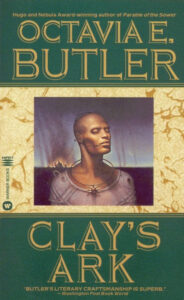
After absolutely adoring Kindred, I decided to read Octavia E. Butler’s Patternist series. I read in publication order, starting with Patternmaster and Mind of My Mind, both of which were good reads, if not mind-blowing ones. But when I moved on to the consensus best book of the series (Wild Seed), it was depressing enough to send me straight into a reading slump. Given that the final book, Clay’s Ark, had a reputation for being one of the bleakest books in the genre, I decided to give the whole series a rest. Six years later, after seeing that it fit a whole lot of Bingo squares, I finally pulled it off the shelf.
[Note: while Clay’s Ark is last in publication order, there’s remarkably little overlap of characters or plot from the two books that take place earlier in the internal chronology. As such, it’s easy enough to review without spoiling the earlier books.]
Clay’s Ark takes place in two timelines in the lawless remnants of the American Southwest. The wealthy are living in walled enclaves, while gangs roam the highways ready to take whatever they can from unprepared passers-by. For those familiar with Butler’s Parable of the Sower, the setting here feels almost like a prototype of that one, except that none of the story takes place in one of the enclaves. Instead, it’s centered around a small desert outpost in which a religious family seeks to live off the grid. The earlier timeline sees the sole survivor of a doomed space mission, plagued by a virus constantly attempting to control his body, seeking shelter in the isolated homestead. The later timeline sees that same family years later raiding the desert for new blood to add to their numbers.
Octavia Butler absolutely loves to unsettle her readers, and that’s on full display here. The threat of rape lingers over almost every chapter, and the book doesn’t shy away even from the incestuous pairings or underage victims. There’s plenty of murder all across the lawless setting, but plenty of readers are numb to murder, and Butler will not let her readers remain numb.
But while the tale’s bleakness and laundry list of content warnings may make it hard to recommend without a host of caveats, it’s never gratuitous. Instead, it’s all part of an unflinching exploration of what it is to hold onto humanity while in situations that destroy one’s agency or even threaten one’s control of their own mind. Having been introduced to Butler’s work through Kindred, it’s hard not to draw the line from the horrors of American slavery and its systemic theft of autonomy to the themes being explored in Clay’s Ark. The leads have all either lost their physical or psychological liberty, setting off both internal and external struggles to hang onto what shreds of humanity they can.
It’s an immersive, expertly-written tale that’s hard to read but also hard to put down. And while it challenges readers to consider horrific actions and ask difficult questions, it has absolutely no interest in providing simple, moralistic answers. Apart from the quality of the storytelling—perhaps including the quality of the storytelling!—the biggest selling point is the fantastically complicated inner struggle besetting the leads. They’re constantly battling their own minds in a way that makes them so much more compelling than the outright villain protagonist seen elsewhere in the series, even when their higher nature is doomed to defeat.
Clay’s Ark is a short novel that drags the reader through the muck but doesn’t linger long. It delivers an ending that resolves many of the major conflicts, and if the resolutions don’t offer many glimmers of long-term hope, they certainly feel appropriate for what came before. As immersive as the whole thing is, I’m not sure I’d have had the psychological energy for 500 pages of it. But 50,000 words or so are enough to tell the story, ask some hard questions, and not drive the reader into total despair.
I’ve now read six novels by Octavia Butler, and for my money, Clay’s Ark is the best apart from Kindred. That’s an opinion that puts me pretty far outside the mainstream consensus, and with the list of content warnings a mile long, it’s easy enough to see why the book may put off a lot of readers. But Butler has a way with words and with looking honestly at impossible situations. If you’ve the stomach for it, Clay’s Ark is an outstanding example of both.
Recommended if you like: dark social commentary, conflicted main characters.
Can I use it for Bingo? It’s hard mode for Last in a Series, Published in the 80s, Parents, and you could argue POC Author too (definitely normal mode, but you wouldn’t have to change much to call this sci-fi/horror).
Overall rating: 18 of Tar Vol’s 20. Five stars on Goodreads.
